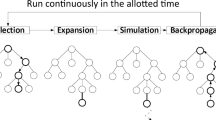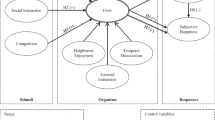Abstract
Previous research has demonstrated that individuals present increased risk taking at the end of a series of gambles, a phenomenon called the ending effect. By using a large online football gambling data, we attempted to replicate the ending effect and tested the existence of a different pattern of increased risk taking at the ending. The results showed that at the end of a series of football gambles, bettors would take more risks, and options with lower risk would be preferred. In games without the interference of local bettors, the ending effect was found to be stronger than that of games with local bettors. Overall, the results provide evidence for the bounded ending effect. Possible underlying mechanisms of the bounded ending effect are explored.




Similar content being viewed by others
References
Ali, M. M. (1977). Probability and utility estimates for racetrack bettors. Journal of Political Economy, 85, 803–815. https://doi.org/10.1086/260600
Asch, P., Malkiel, B. G., & Quandt, R. E. (1982). Racetrack betting and informed behavior. Journal of Financial Economics, 10, 187–194. https://doi.org/10.1016/0304-405X(82)90012-5
Babad, E., & Katz, Y. (1991). Wishful thinking—against all odds. Journal of Applied Social Psychology, 21, 1921–1938. https://doi.org/10.1111/j.1559-1816.1991.tb00514.x
Boulier, B., & Stekler, H. (2003). Predicting the outcomes of National football league games. International Journal of Forecasting, 24, 285–300https://doi.org/10.1016/s0169-2070(01)00144-3
Carstensen, L. L. (2006). The influence of a sense of time on human development. Science, 312, 1913–1915. https://doi.org/10.1126/science.1127488
Carstensen, L. L., Isaacowitz, D. M., & Charles, S. T. (1999). Taking time seriously: A theory of socioemotional selectivity. American Psychologist, 54(3), 165–181. https://doi.org/10.1037/0003-066X.54.3.165
Effron, D. A., Bryan, C. J., & Murnighan, J. K. (2015). Cheating at the end to avoid regret. Journal of Personality and Social Psychology, 109(3), 395–414. https://doi.org/10.1037/pspa0000026
Finucane, M. L., Alhakami, A., Slovic, P., & Johnson, S. M. (2000). The affect heuristic in judgments of risks and benefits. Journal of Behavioral Decision Making, 13(1), 1–17. https://doi.org/10.1002/(SICI)1099-0771(200001/03)13:1<1::AID-BDM333>3.0.CO;2-S
Forrest, D., Goddard, J., & Simmons, R. (2005). Odds-setters as forecasters: The case of English football. International Journal of Forecasting, 21, 551–564. https://doi.org/10.1016/j.ijforecast.2005.03.003
French, K. R., & Poterba, J. M. (1991). Investor Diversification and International Equity Markets. The American Economic Review, 81(2), 222–226
Fung, H. H., & Carstensen, L. L. (2006). Goals change when life’s fragility is primed: Lessons learned from older adults, the September 11 attacks and SARS. Social Cognition, 24, 2481–278. https://doi.org/10.1521/soco.2006.24.3.248
Heath, C., & Tversky, A. (1991). Preference and belief: Ambiguity and competence in choice under uncertainty. Journal of Risk and Uncertainty, 4, 5–28. https://doi.org/10.1007/BF00057884
Huang, Y., Qiu, H., & Wu, Z. (2016). Local bias of investor attention: Evidence from China’s internet stock message boards. Journal of Empirical Finance, 38, 338–54. https://doi.org/10.1016/j.jempfin.2016.07.007
Huber, M., Van Boven, L., McGraw, A. P., & Johnson-Graham, L. (2011). Whom to help? Immediacy bias in judgments of decisions about humanitarian aid. Organizational Behavior and Human Decision, 115(2), 283–293. https://doi.org/10.1177/146167218788829
Johnson, J. E. V., & Bruce, A. C. (1993). Gluck’s second law: An empirical investigation of horserace betting in early and late races. Psychological Reports, 72, 1251–1258. https://doi.org/10.2466/pr0.1993.72.3c.1251
Karlsson, A., & Nordén, L. (2007). Home sweet home: Home bias and international diversification among individual investors. Journal of Banking & Finance, 31(2), 317–333. https://doi.org/10.1016/j.jbankfin.2006.04.005
Kopelman, R. E., & Minkin, B. L. (1991). Toward a psychology of parimutuel behavior: Test of Gluck’s Laws. Psychological Reports, 68, 701–702. https://doi.org/10.2466/pr0.1991.68.2.701
Kőszegi, B., & Rabin, M. (2007). Reference-Dependent Risk Attitudes. American Economic Review, 97(4), 1047–1073. https://doi.org/10.1257/aer.97.4.1047
Krizan, Z., & Windschitl, P. D. (2007). The influence of outcome desirability on optimism. Psychological Bulletin, 133(1), 95–121. https://doi.org/10.1037/0033-2909.133.1.95
Lerner, J. S., Li, Y., Valdesolo, P., & Kassam, K. (2015). Emotion and Decision Making. Review in Advance. https://doi.org/10.1146/annurev-psych-010213-115043
Löckenhoff, C. E., Maresca, S. N., & Reed, A. E. (2012). Who saves the best for last? Age differences in decisions about affective sequences. Psychology and Aging, 27, 840–848. https://doi.org/10.1037/a0028747
Loewenstein, G. F., Weber, E. U., Hsee, C. K., & Welch, N. (2001). Risk as feelings. Psychological Bulletin, 127(2), 267–286. https://doi.org/10.1037/0033-2909.127.2.267
Lütje, T., & Menkhoff, L. (2007). What drives home bias? Evidence from fund managers’ views. International Journal of Finance & Economics, 12, 21–35. https://doi.org/10.1002/ijfe.309
Mather, M., & Carstensen, L. L. (2003). Aging and attentional biases for emotional faces. Psychological Science, 14(5), 409–415. https://doi.org/10.1111/1467-9280.01455
McKenzie, C. R. M., Sher, S., Müller-Trede, J., Lin, C., Liersch, M. J., & Rawstron, A. G. (2016). Are longshots only for losers? A new look at the last race effect. Journal of Behavioral Decision Making, 29(1), 25–36. https://doi.org/10.1002/bdm.1873
Metzger, M. A. (1985). Biases in betting: An application of laboratory findings. Psychological Reports, 56, 883–888. https://doi.org/10.2466/pr0.1985.56.3.883
Normann, H. T., & Wallace, B. (2012). The impact of the termination rule on cooperation in a prisoner’s dilemma experiment. International Journal of Game Theory, 41, 707–718. https://doi.org/10.1007/s00182-012-0341-y.
O’Brien, E., & Ellsworth, P. C. (2012). Saving the last for best. Psychological Science, 23, 163–165. https://doi.org/10.1177/0956797611427408
Pachur, T., & Biele, G. (2007). Forecasting from ignorance: The use and usefulness of recognition in lay predictions of sports events. Acta Psychologica, 125(1), 99–116. https://doi.org/10.1016/j.actpsy.2006.07.002
Sperb, L. F. C., Sung, M. C., Johnson, J. E. V., & Ma, T. (2018). Keeping a weather eye on prediction markets: The influence of environmental conditions on forecasting accuracy. International Journal of Forecasting, 35(1), 321–335. https://doi.org/10.1016/j.ijforecast.2018.04.005
Staněk, R. (2017). Home bias in sport betting: Evidence from Czech betting market. Judgment and Decision Making, 12(2), 168–172
Strough, J., Bruine de Bruin, W., & Parker, A. M. (2019). Taking the biggest first: Age differences in preferences for monetary and hedonic sequences. The Journals of Gerontology: Series B: Psychological Sciences and Social Sciences, 74(6), 964–974. https://doi.org/10.1093/geronb/gbx160
Sung, M., & Johnson, J. E. V. (2007). Comparing the effectiveness of one and two-step conditional logit models for predicting outcomes in a speculative marker. Journal of Prediction Markets, 1, 43–59. https://doi.org/10.5750/jpm.v1i1.419
Xing, C., Meng, Y., Isaacowitz, D. M., Song, Y., & Cai, J. (2019). Motivated to Gain: Awareness of an Impending Ending and the Ending Effect. Frontiers in Psychology. https://doi.org/10.3389/fpsyg.2018.02717
Xing, C., Meng, Y., Isaacowitz, D. M., Wen, Y., & Lin, Z. (2018). The ending effect in investment decisions: The motivational need for an emotionally rewarding ending. Personality and Social Psychology Bulletin, 45(4), 510–527. https://doi.org/10.1177/0146167218788829
Yip, A. P. W., & Löckenhoff, C. E. (2018). Cultural Differences in “Saving the Best for Last. Journal of Cross-Cultural Psychology, 49(9), 1358–1375. https://doi.org/10.1177/0022022118793535
Funding
This research was preregistered on OSF https://osf.io/dpjkb. This research was supported by National Natural Science Foundation of China Grant 71873133 awarded to Cai Xing.
Author information
Authors and Affiliations
Corresponding author
Additional information
Publisher’s Note
Springer Nature remains neutral with regard to jurisdictional claims in published maps and institutional affiliations.
Rights and permissions
About this article
Cite this article
Wang, Q., Yin, F. & Xing, C. The Bounded Ending Effect in the Domain of Football Gambling: High Risks Are Not Always Preferred at the End. J Gambl Stud 38, 1323–1335 (2022). https://doi.org/10.1007/s10899-021-10085-4
Received:
Revised:
Accepted:
Published:
Issue Date:
DOI: https://doi.org/10.1007/s10899-021-10085-4




